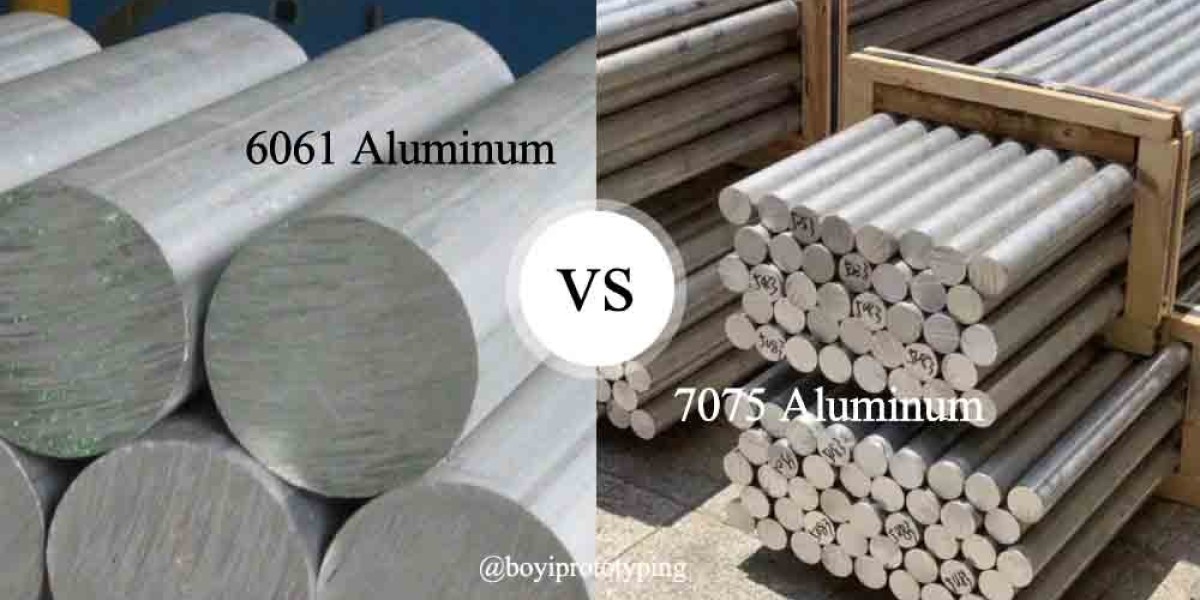Introduction
In the world of manufacturing and engineering, selecting the right material is crucial to the success of any project. When it comes to aluminum alloys, 6061 and 7075 are two of the most popular and widely used options. Each has distinct advantages, making them ideal for different applications. Understanding the differences between these alloys will help you choose the one that best meets your project’s requirements, whether it’s strength, corrosion resistance, or ease of machining.
This article compares 6061 vs 7075 aluminum, focusing on their mechanical properties, applications, cost, and more. By the end of this guide, you’ll have a better understanding of which alloy is best suited for your needs.
What are 6061 and 7075 Aluminum Alloys?
Both 6061 and 7075 are heat-treated aluminum alloys that belong to the 6000 and 7000 series, respectively. However, their composition and properties differ significantly, which makes them suited to different types of projects.
6061 Aluminum Alloy
6061 is one of the most commonly used aluminum alloys. Known for its versatility and ease of fabrication, 6061 is a heat-treated alloy made primarily of aluminum, magnesium, and silicon. It is a medium-strength alloy with excellent corrosion resistance, making it suitable for a wide range of applications across industries.
6061 aluminum is particularly known for its good weldability, machinability, and ability to be anodized for improved corrosion resistance. It is widely used in applications like aerospace components, structural frames, and marine parts.
7075 Aluminum Alloy
On the other hand, 7075 aluminum is a high-strength alloy primarily composed of aluminum and zinc. It’s one of the strongest aluminum alloys available, offering excellent strength-to-weight ratio. Because of its high strength, 7075 is often used in demanding applications where strength is paramount, such as aerospace, military, and high-performance automotive components.
However, 7075 aluminum is harder to machine and weld compared to 6061. It also has lower corrosion resistance, meaning it may require additional protective coatings for use in harsh environments.
Key Differences Between 6061 and 7075 Aluminum
1. Mechanical Properties
The mechanical properties of aluminum alloys, such as strength, hardness, and toughness, are essential factors when deciding which alloy to use. Let's compare the key mechanical properties of 6061 and 7075:
Tensile Strength
- 6061 Aluminum: Tensile strength of about 290 MPa (42,000 psi)
- 7075 Aluminum: Tensile strength of about 572 MPa (83,000 psi)
The 7075 aluminum alloy is known for its superior strength. Its tensile strength is nearly twice that of 6061, making it ideal for high-stress applications. On the other hand, 6061 is much more suited for general-purpose applications that don't require the extreme strength of 7075.
Yield Strength
- 6061 Aluminum: Yield strength of about 240 MPa (35,000 psi)
- 7075 Aluminum: Yield strength of about 503 MPa (73,000 psi)
Again, 7075 aluminum is much stronger than 6061 in terms of yield strength, which means it can withstand more stress before deforming permanently. This is one of the key reasons why 7075 is used in high-performance industries.
Hardness
- 6061 Aluminum: Hardness rating of around 95 Brinell
- 7075 Aluminum: Hardness rating of around 150 Brinell
The higher hardness of 7075 makes it more resistant to wear and abrasion. This contributes to its use in parts that must endure heavy loads or rough conditions, such as aircraft and military vehicles.
2. Corrosion Resistance
One of the key considerations when choosing between 6061 and 7075 is their ability to resist corrosion, especially in industries such as marine, aerospace, and construction, where exposure to moisture or chemicals is common.
6061 Aluminum: Known for its excellent corrosion resistance, especially in outdoor and marine environments. It is resistant to saltwater, making it a great choice for applications that require long-term exposure to harsh elements.
7075 Aluminum: 7075 has good corrosion resistance but is not as resistant as 6061. It is prone to stress corrosion cracking in certain environments and may require additional coatings or anodizing to improve its resistance to corrosion.
If your application involves exposure to corrosive environments, 6061 would likely be a better choice due to its superior corrosion resistance.
3. Machinability and Fabrication
The ease of machining and fabrication can have a significant impact on project timelines and costs. This is especially important for parts that require complex shapes or need to be produced in high quantities.
6061 Aluminum: 6061 is known for its excellent machinability. It is relatively easy to cut, drill, weld, and extrude. This alloy is used extensively in applications that require tight tolerances and complex shapes.
7075 Aluminum: While 7075 is machinable, it is more difficult to work with due to its higher strength. The increased strength can cause issues such as tool wear and the need for more specialized equipment. The machining process is typically slower and more costly for 7075 compared to 6061.
For general manufacturing and fabrication, 6061 aluminum is the more cost-effective and versatile choice due to its easier machinability.
4. Weldability
The ability to weld aluminum alloys is a critical factor for many manufacturing applications. The weldability of a material determines how easily it can be joined to other pieces of material.
6061 Aluminum: 6061 is well-known for its excellent weldability. It can be welded using various methods like TIG (Tungsten Inert Gas) and MIG (Metal Inert Gas) welding without significant challenges. However, after welding, it may require heat treatment to restore its strength.
7075 Aluminum: 7075 is much more difficult to weld due to its high strength. It is prone to cracking when welded, and it often requires preheating and post-weld heat treatment to ensure a quality weld. As a result, 7075 is not typically chosen for applications that require extensive welding.
5. Cost Comparison
Cost can be a deciding factor when selecting materials, particularly for large-scale or budget-conscious projects.
6061 Aluminum: 6061 is typically more affordable than 7075 due to its more straightforward manufacturing processes and lower material cost. This makes it a more cost-effective choice for a wide variety of applications, including commercial and industrial uses.
7075 Aluminum: 7075 aluminum is more expensive due to its higher strength, more complex manufacturing processes, and the need for specialized equipment. This higher cost can be justified for applications where maximum strength and performance are required, but may not be ideal for projects with a tighter budget.
6. Applications
Both 6061 and 7075 are used across many industries, but their specific applications differ based on their strengths and properties.
6061 Aluminum Applications:
- Aerospace: Aircraft frames, structural components, and fuel tanks
- Marine: Boat hulls, railings, and other parts exposed to saltwater
- Automotive: Suspension components, frames, and wheels
- Construction: Structural supports, beams, and bridges
- Consumer Products: Bicycle frames, sporting goods, and electronic enclosures
7075 Aluminum Applications:
- Aerospace: Aircraft wings, fuselage components, and landing gear
- Military: Structural parts for vehicles, weapons, and equipment
- Sports: High-performance mountain bikes and sporting equipment
- Robotics: Parts requiring high strength and low weight
7. Which Alloy Should You Choose?
Ultimately, the choice between 6061 and 7075 aluminum comes down to the specific needs of your project.
Choose 6061 aluminum if:
- You need an all-around versatile alloy with good strength and corrosion resistance
- Machinability, weldability, and cost-effectiveness are important factors
- You are working with general-purpose applications like structural frames, marine components, or automotive parts
Choose 7075 aluminum if:
- Maximum strength is the primary requirement, especially in aerospace, military, or high-performance applications
- You are working with parts that need to endure extreme conditions and high stress
- You are prepared to invest in specialized machinery and processes for fabrication and welding
Conclusion
Both 6061 and 7075 aluminum alloys have their place in the world of manufacturing, and understanding their differences is key to choosing the right material for your project. 6061 aluminum is a versatile, cost-effective choice for many applications, while 7075 aluminum is unmatched in terms of strength and is ideal for high-performance environments where strength is the top priority. By considering factors like mechanical properties, machinability, corrosion resistance, and cost, you can make an informed decision that will ensure the success of your project.







